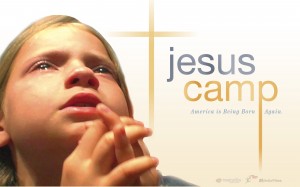 In their film, directors Heidi Ewing and Rachel Grady offer their audiences a glimpse into the experiences of some of the people who form the radical Christian Evangelical subculture. Jesus Camp follows a group of children as they participate in a summer camp called “Kids on Fire,” run by Pastor Becky Fischer. The footage documenting events, and interviews of the participants and their parents at the summer camp, are framed by excerpts of a radio talk show hosted by Mike Papantonio. Papantonio represents the voice of dissent in a film whose subjects purport a very singular religious-political ideology.
In their film, directors Heidi Ewing and Rachel Grady offer their audiences a glimpse into the experiences of some of the people who form the radical Christian Evangelical subculture. Jesus Camp follows a group of children as they participate in a summer camp called “Kids on Fire,” run by Pastor Becky Fischer. The footage documenting events, and interviews of the participants and their parents at the summer camp, are framed by excerpts of a radio talk show hosted by Mike Papantonio. Papantonio represents the voice of dissent in a film whose subjects purport a very singular religious-political ideology.
The film begins with images of the road and towns in Missouri, while the sound track switches between radio stations reporting the news of Sandra Day O’Connor’s resignation from the Supreme Court and those on which talk show hosts say things like, “We are engaged today in what they call a Culture War. We didn’t start it, but by His grace we’re going to end it. Say, ‘Yes, we want to reclaim America for Christ.’” From here the film goes into Papantonio’s studio where we see him critiquing the religious-right’s role in the political arena. The directors use the first four minutes of the film to establish a political framework through which interpret the events that will unfold.
Most of the remainder of the documentary consists of shots of camp activities and interviews with camp participants Levi (age 12), Tory (age 10), and Rachael (age 9), their parents, and Fischer. Through these interviews we learn that many of the children are homeschooled by their Evangelical Christian parents and are taught things like creationism and that science is untrustworthy. The camp activities range from the more common Christian camp activities like group prayers in which participants beg forgiveness for their sins to seemingly very political activities like praying over a life-size cardboard cutout of George W. Bush.
Given the controversial nature of many of the things shown and said (at one point Fischer compares her summer camp to Palestinian militant training camps for child soldiers), the directors tried to keep their presentation as objective as possible. They expressly desired to keep their own bias out of the film and accomplished this through some interesting documentary techniques. For example, the directors are never seen in the film; the audience only ever hears the answers and the questions posed during interviews. Following the first screening of their film in New York’s Tribeca Film Festival, the directors changed the musical score because they “felt that it was too judgmental-sounding and [they] were painfully trying to come to the film with a neutral eye.”
Despite their efforts to be objective documentarians, Ewing and Grady expressed not being able to resist placing the story of “Kids on Fire” into a national context by putting it in conversation with liberal-Christian Papantonio’s radio talk show. This occurs very literally when, at one point, Fischer calls in to the show and the two hold a debate on the matter of indoctrinating children. Even with the political framework that the directors explicitly create for the story of the camp, the film does manage to present all opinions expressed with respect and in such a way that leaves the audience to come to their own conclusions and question their beliefs.
Nw York TImes review: http://movies.nytimes.com/2006/09/22/movies/22camp.html?_r=0
Interviews with filmmakers: http://www.nycmovieguru.com/rachelgradyheidiewing.html
http://www.youtube.com/watch?v=bWFBfh7gmZc
